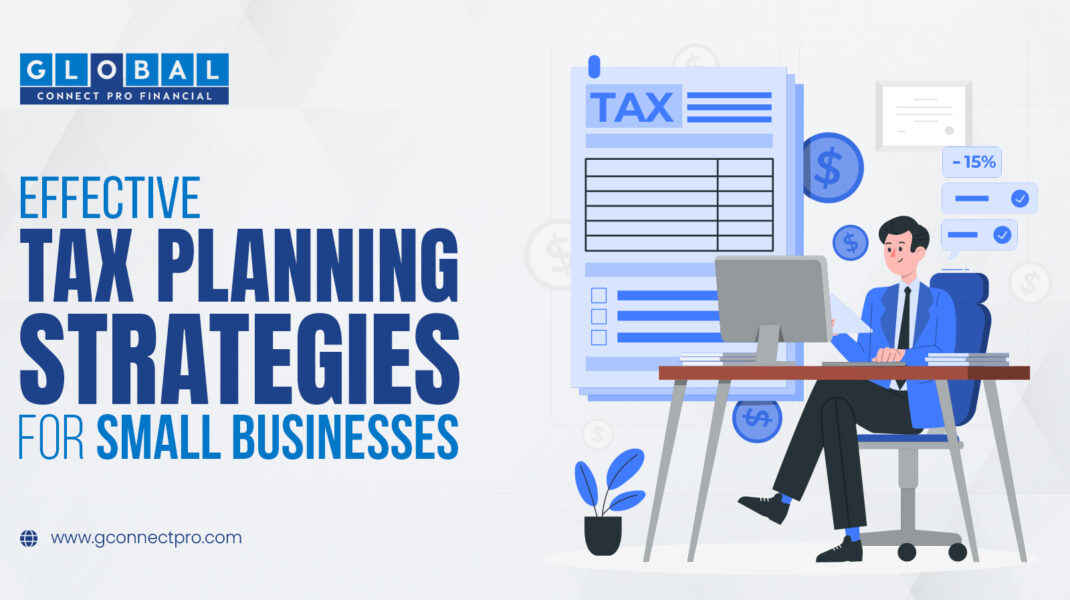8 Effective Tax Planning Strategies for Small Businesses

Running a small business is no easy feat, and one of the biggest headaches can be dealing with taxes. But with a bit of planning, you can save money and avoid stress. At GConnectPro, we’re all about helping you find the best financial solutions. Here are some simple yet effective tax planning strategies to help your small business keep more of its hard-earned money.
Smart Tax Planning Strategies to Save Money on Taxes for Your Small Business:
1. Know Your Tax Responsibilities
The first step to saving on taxes is knowing what you owe. Small businesses might have to pay different types of taxes, like income tax, self-employment tax, payroll tax, and sales tax. Each type of tax has its own rules and deadlines, so it’s important to stay on top of them. For instance, income tax depends on your business’s earnings and structure, while payroll tax involves withholding money from your employees’ paychecks and sending it to the government. Understanding these responsibilities can help you avoid costly mistakes and fines.
2. Keep Detailed Records
Good record-keeping is crucial for tax planning, especially if you are considering applying for a startup loan. Keeping accurate records of your income and expenses makes it easier to prepare your tax returns and claim deductions. Using accounting software can help keep everything organized and up-to-date. Accurate records give you a clear picture of your financial situation, which helps in making smart business decisions. Plus, if the IRS ever audits your business, having well-organized records can make the process much less stressful.
3. Take Advantage of Tax Deductions
Small businesses can save a lot of money by taking advantage of tax deductions, which reduce your taxable income. Common deductions include expenses for office supplies, utilities, travel, and employee salaries. If you work from home, you might also be able to deduct home office expenses. Section 179 deductions let you write off the cost of equipment purchases. By understanding all the deductions available, you can significantly lower your tax bill. For example, if you use your car for business, you can deduct mileage or actual expenses like gas and maintenance.
4. Choose the Right Business Structure
– Impact on Taxes: The way your business is structured affects your tax bill.
– Different Structures: Sole proprietorship, partnership, corporation, or LLC.
– Tax Benefits and Drawbacks: Each structure has different tax benefits and drawbacks.
– Professional Advice: Consulting a tax professional can help you pick the best structure to save on taxes.
4. Plan for Retirement
Saving for retirement not only secures your future but also offers tax benefits. Options like SEP IRAs, SIMPLE IRAs, and 401(k) plans let small business owners save for retirement while reducing taxable income. Contributions to these plans are usually tax-deductible, meaning you pay less in taxes now. For instance, a SEP IRA allows you to contribute up to 25% of your net earnings, which can lead to significant tax savings. Exploring different retirement plans and understanding their tax implications can help you choose the best option for both immediate and long-term benefits.
5. Stay Updated on Tax Laws
Tax laws change frequently, and staying updated is crucial for effective tax planning, especially if you are considering a short term loan. New tax laws can impact your business’s tax liabilities and opportunities for deductions. Regularly consulting with a tax advisor or financial consultant ensures you stay informed about these changes and how they affect your business. For example, new tax credits or deductions might be introduced, offering new ways to save, while changes to existing laws could alter your current tax strategy. Staying informed helps you adapt quickly and make decisions that benefit your business.
6. Make the Most of Depreciation
– Spreading Costs: Depreciation allows you to spread the cost of big purchases over several years.
– Tax Deductions: Make sure you’re taking full advantage of these deductions, including bonus depreciation and Section 179 expensing.
– Maximizing Benefits: Understanding these options can help you plan your purchases to get the most tax benefits.
7. Use Tax Software
Investing in good tax software can make tax planning and preparation easier. These tools help ensure accuracy, maximize deductions, and keep you compliant with tax laws. Tax software can also provide valuable insights into your financial performance, helping you make better business decisions. Many tax software programs offer features like automated calculations, e-filing, and updates on tax law changes. By using these tools, you can save time, reduce errors, and focus more on running your business. Choosing the right tax software for your needs can greatly improve your tax planning efforts.
8. Hire a Professional
While many small business owners handle their own taxes, hiring a professional can provide significant benefits. A tax advisor or accountant can offer expert guidance, ensure compliance, and find savings opportunities you might miss. Their expertise can be invaluable, especially as your business grows. They can also help with complex tax issues, like multi-state filings or audits. By working with a knowledgeable tax professional, you can have peace of mind knowing your taxes are handled correctly and you’re taking full advantage of tax-saving opportunities.
Conclusion:
Effective tax planning strategies is essential for the financial health and growth of your small business. By understanding your obligations, leveraging deductions, and staying informed about tax laws, you can maximize your savings and ensure compliance. At GConnectPro, we’re here to help you navigate the complexities of tax planning and provide tailored financial solutions to meet your business needs. For personalized assistance and expert advice, contact GConnectPro today. Let us help you achieve your financial goals and drive your business success.


Write a reply or comment
You must be logged in to post a comment.